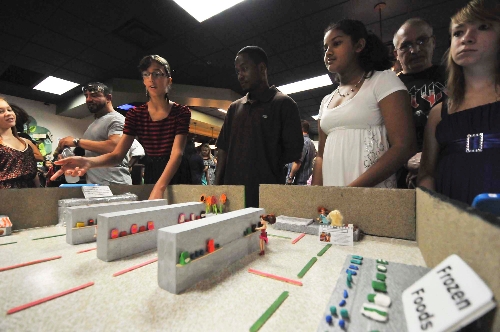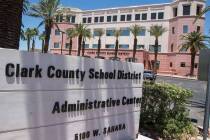Summer program has students sink teeth into food industry
Do not eat Twinkies.
That was Becker Middle School student Zoe Kaplan's advice after spending part of her summer learning about all things food. Or nonfood, in the case of Twinkies.
"They're not food," she said of the creamy concoction. "They're just chemicals. Literally, there's nothing food about them."
Zoe and 112 other middle school students attended Henderson Summer, a five-week program held July 9 through Aug. 10 by GB Henderson Education at The Alexander Dawson School at Rainbow Mountain, 10845 W. Desert Inn Road. GB Henderson Education, formerly the Dawson Center, is a foundation that supports the school and educational programs.
For the first half of the program, students spent classroom time learning about all manner of the modern American food industry and heard from guest speakers.
For the second half they split into groups to create a project based on the food theme.
Zoe's group created a 15-foot timeline, titled Processed, Boxed and Sold: The Industrialization and Modern Marketing of American Food.
Sliced bread and Pepsi Next bookend the timeline. Zoe's dreaded Twinkies arrived in 1930.
Fellow group member Amanda Byerman, who also attends Becker, 9151 Pinewood Hills Drive, took home with her what she studied.
"I know that my family's eating a lot better because of what I've learned here," she said. "We're eating a lot more organic produce and natural foods.
"Moderation is key when you're eating. It's OK to go to McDonald's every month or so, but don't do it every day."
Zoe and Amanda's project was displayed at an Aug. 9 event along with dozens more at Technique, the student-run restaurant at Le Cordon Bleu College of Culinary Arts, 1451 Center Crossing Road. Hundreds of proud parents packed the small restaurant, hungry for video and stills of their kids.
GB Henderson has a rigorous application process and selects only the top students from the Clark County School District's public schools to attend the free program.
"It teaches leadership skills, critical thinking and teamwork," said Lisa Michael, program manager for Henderson Connect, part of GB Henderson Education. "...The hope is that you learn something, and then next year you actually build it out and do something for the community."
This summer's students will be invited back next year to implement some kind of food program to improve the community, Michael said.
The Henderson Summer program started in 2008, and students in the past studied themes of water, energy and epidemics. Students in those programs came back the following year to create hand-washing and water-conservation campaigns at elementary schools and a Regional Transportation Commission of Southern Nevada campaign to encourage motorists to conserve fuel.
The theme for next year's program will be finance, Michael said.
"We're hoping to tie all the things together," she said. "How money drives energy; money drives decisions about water rights."
But that is a year away. Back at Technique, Becker student Sian Bailey and Anisha Jain, a student at Hyde Park Middle School, 900 Hinson St., presented their group's project to interested parents.
It explained the psychology behind the organization of grocery stores. They built a model grocery and a standard-sized shelf display to help show how stores subtly seduce shoppers to spend more than they had planned.
"All the items you want are spaced out," Anisha said. "You tend to have to walk around to get what you want."
Sian explained how smell is the first sense the stores target.
"You walk in, and there are flowers," she said. "The flowers are here because you see bright colors and smell them, and it puts you at ease. The bakery is also near the front. You smell those, and it puts you at ease."
They explained that the healthiest foods are usually around the perimeter of the store while the unhealthy foods are in the aisles. The food people really want ---- meat and dairy ---- is always in the back, so taking a shortcut leaves shoppers susceptible to junk food.
"It's basically a casino layout," Sian said. "You're in here for more time than you want to be, and you spend more money."
The group also handed out laminated cards with seven grocery shopping tips: go shopping with a list; don't go shopping when you're hungry; stay on the perimeter of the store; read labels carefully; consider store name brands; shop at the top and bottom of shelves; and be skeptical of end-cap displays.
The fourth tip ---- read labels carefully ---- was the project focus of Hyde Park student Sarah Shaw.
She created a game where two similar products were placed side by side in categories such as sodium, carbohydrates, calories, saturated fat, trans fat, sugar and more. Passersby guessed which product had more in each category. For example, a box of organic toaster pastries seemed healthier than the colorful, fancy box of Pop-Tarts but had more saturated fat and sugar.
"No matter what it says on the cover, it's not exactly what you think it is," Sarah said. "Before you buy stuff, definitely read the label."
But even labels can be misleading, Sarah pointed out.
A common natural flavor substitute for raspberry and other flavors is castoreum, a secretion that comes from the anal glands of beavers. "Natural flavor" is more appealing on food labels.
The finale of the exhibition was a cooking competition among four student teams. They had to prepare pizzas and salads from scratch for four judges. Technique executive chef Ward Daughters, CEC, CCE, was in charge of the competition and also served as a judge. Team Lasagna, made up of Gabriel Esguerra, Lauren Petrosky and Myah Maxwell, won.
A few minutes before the winners were announced, Daughters leaned in quietly to share something with one of the losing teams, Team Ice Cream.
"You guys are so smart. Stay that way," he said.
For more information about Henderson Summer and GB Henderson Education, visit gbhendersoneducation.org.
Contact View education reporter Jeff Mosier at jmosier@viewnews.com or 224-5524.























